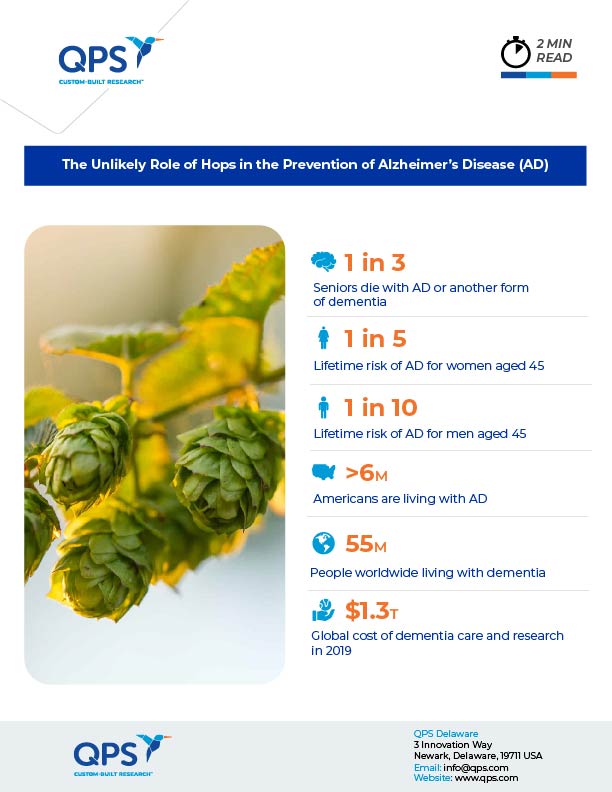A team of Italian scientists from the University of Milan-Bicocca have recently discovered a possible use of hops, the flowers used to enhance both the aroma and flavor of beer, as a means of preventing the biological changes that eventually result in the onset of Alzheimer’s disease (AD). Headed by Cristina Arioldi and Alessandro Palmioli, the team hopes to continue ongoing research on the abilities of hops to prevent the disease. In the abstract of their study, the team states that the “search for natural compounds, whose intake through diet can help prevent the main biochemical mechanisms responsible for AD onset led [the team] to screen hops, one of the main ingredients of beer” which had shown promising results in prior studies. Don’t look to happy hour for a healthier brain though. The researchers propose that chemicals found in hops could be added to food/medicine to create beneficial “nutraceuticals.”
Research into the disease’s prevention and treatment is complicated by the pathology of AD and the fact that the effects of the disease are usually only evident long after damage first occurs in the brain. Furthermore, the symptoms associated with AD are generally agreed to be the result of numerous, simultaneously acting factors within an aging brain. This has made research attempts to prevent and treat the disease difficult. However, research points to the aggregation of neurotoxic proteins, known as amyloid beta proteins, as one of the primary causes of the degeneration of brain functions.
The researchers analyzed the four major hop extracts used by beer manufacturers and compared their antiaggregating properties in vitro against human neuroblastoma cells. They found that hops from “Tettnang” extract, used in the production of lighter beers and lagers, was the most effective in preventing the development of the characteristic protein clumps. Additionally, the compounds present in the extract aided the body in eliminating accumulated neurotoxic proteins.
Some Theory Behind the Hope Offered by Hops
The team first found that, after breaking down the Tettnang hops extract into fractional components, the extracts with highest levels of polyphenols offer the most promising prospects in the treatment and prevention of AD. Polyphenols include chemical compounds, such as antioxidants, in plants that grant numerous health benefits outside of AD prevention. The researchers believe that these high-polyphenol extracts could act as a strong antibiotic and as the best means of inhibiting the aggregation of dangerous amyloid beta proteins in the brain. The compounds also seem to prevent cell death as a result of oxidation or autophagy. After testing the chemical compounds in roundworms, one of the smallest animals with a nervous system, the worms seemed to experience fewer cases of AD-associated paralysis, though the effect was modest.
The Potential for Hops in AD Prevention
This research does not suggest you can drink your way to a healthy brain. However, harnessing the disease-fighting compounds produced by hops could offer a path to disease prevention. The researchers suggest that the hop compounds could benefit multiple areas of the body, which may be key to improving brain health with increasing age.
Did you enjoy this blog post? Check out our other blog posts as well as related topics on our Webinar page.
QPS is a GLP- and GCP-compliant contract research organization (CRO) delivering the highest grade of discovery, preclinical and clinical drug research development services. Since 1995, it has grown from a tiny bioanalysis shop to a full-service CRO with 1,200+ employees in the U.S., Europe and Asia. Today, QPS offers expanded pharmaceutical contract R&D services with special expertise in neuropharmacology, DMPK, toxicology, bioanalysis, translational medicine and clinical development. An award-winning leader focused on bioanalytics and clinical trials, QPS is known for proven quality standards, technical expertise, a flexible approach to research, client satisfaction and turnkey laboratories and facilities. Through continual enhancements in capacities and resources, QPS stands tall in its commitment to delivering superior quality, skilled performance and trusted service to its valued customers. For more information, visit www.qps.com or email [email protected].






